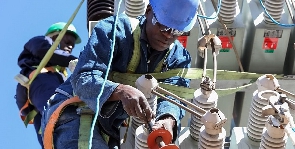 The other African countries to also make the breakthrough are Ethiopia, Kenya, Senegal and Rwanda
The other African countries to also make the breakthrough are Ethiopia, Kenya, Senegal and Rwanda
Ghana is among a handful of countries that are “on track to achieve universal access to electricity” by 2030, according to the World Energy Outlook 2020 published, on Tuesday, by the International Energy Agency (IEA).
The other African countries to also make the breakthrough are Ethiopia, Kenya, Senegal and Rwanda.
The WEO has been published amid the disruption and uncertainty caused by the COVID-19 pandemic, that has led to a drop in global emissions.
However, the Outlook says that the world still has to come up with “well-designed energy policies for a resilient energy system that can meet climate goals”.
It says global emissions are set to bounce back more slowly than after the financial crisis of 2008-2009, but the world is still a long way from a sustainable recovery.
“Despite a record drop in global emissions this year, the world is far from doing enough to put them into decisive decline,” said Dr Fatih Birol, the IEA’s Executive Director.
“The economic downturn has temporarily suppressed emissions, but low economic growth is not a low-emissions strategy – it is a strategy that would only serve to further impoverish the world’s most vulnerable populations.
“Only faster structural changes to the way we produce and consume energy can break the emissions trend for good.
“Governments have the capacity and the responsibility to take decisive actions to accelerate clean energy transitions and put the world on a path to reaching our climate goals, including net-zero emissions.”
The report points out that investment in clean energy offers a way to boost economic growth, create jobs and reduce emissions.
Dr Birol said: “Africa holds the key for global energy transitions, as it is the continent with the most important ingredients for producing critical technologies.”
The Tema LNG Terminal, for instance, positions Ghana as a regional hub for gas, allowing other nations to benefit from connectivity to the international market, while offering a cost-effective and reliable source of energy to help develop the economies of Ghana and its neighbours, according to energy experts.
“Africa’s infrastructure needs currently present a challenge to its development, but also offer a major opportunity for long-term growth,” one energy expert said in London.
“Demand is increasing for raw minerals both in Africa and worldwide.
“With the right investments and infrastructure plan, and the developments of projects like the Tema LNG Terminal, African countries can use modern technologies and expertise to deliver long-lasting, sustainable benefits to their societies.
“This can then spur development in other areas through increased income, stability of energy supply and increased regional and international trade.”
The WEO, however, says, all this would be dependent on the electricity sector playing “a key role in supporting economic recovery, and an increasingly important long-term role in providing the energy that the world needs.